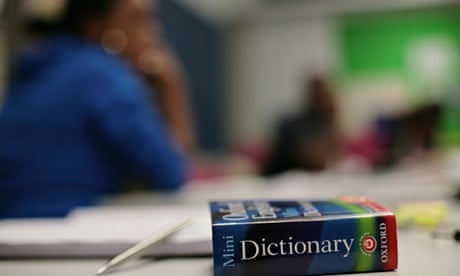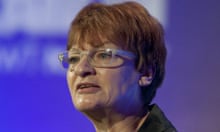A secondary school in Leeds at which more than three-quarters of pupils do not have English as a mother tongue has introduced lessons for all pupils to teach them English as a foreign language.
The headteacher, Georgina Sale, said all pupils of City of Leeds secondary school, including those for whom English was a first language, would soon receive the extra 50-minute lesson each week.
The extra tuition would "boost their fundamental English skills and improve their basic spelling and grammar", she said. "We hope this will allow pupils who speak English as a first language as well as our multilingual learners the same opportunity to accomplish A and A* grades at GCSE."
Sale said 55 nationalities were represented among the school's 314 students, including pupils from Europe, several African nations, the Middle East, Pakistan, Afghanistan and India. A growing number were from eastern European Roma communities.
The school's decision follows a poor Ofsted report and disappointing exam results. In recent years the school has faced the threat of closure.
It has also had to cope with an increasing number of arrivals from abroad. Two years ago, just 40 nationalities were represented, according to the 2012 Ofsted inspection report.
Recent parent meetings have been simultaneously translated into Urdu, Czech and Polish, and the school has recently employed teachers who speak Czech, Romanian, Russian and German.
Now, the proportion of students who speak English as an additional language is about four times larger than the national figure, and many are at an early stage of learning it.
Sale said: "We are proud to be a multi-cultural school and will continue to encourage new ideas to help us to be a supportive and encouraging learning environment where all pupils are given the same chances to learn."The extra lesson would be fitted into the existing timetable so that the school day remained the same length, a spokesman from Leeds city council said.
It is understood the plan is to shorten each of the existing lessons by 10 minutes one day a week to make room for the English class.
No additional staff would be taken on, the council spokesman said.
The school's most recent Ofsted report, in May last year, said the school "requires improvement" but noted that "students who have recently arrived in the country and their families are supported with compassion and care." Sale, who joined the school in 2011, was praised in the Ofsted 2013 report for her "boundless energy" and the "swift improvements" she had brought about in teaching and students' achievement.
But last summer just 26% of pupils achieved five or more GCSEs at grade A* to C, including English and maths.
In 2010, the school faced the threat of closure because of its poor results but was allowed to remain open after a passionate campaign by parents and staff.
The new scheme was cautiously welcomed by linguistic experts. Dr Dina Mehmedbegovic, from the Institute of Education in London, said: "I think it's excellent that the headteacher is doing this because she is drawing attention that something is wrong in the system. There really is a big gap in provision for these children in the system which is in stark contrast to the number of non-native speakers entering our schools."
Helen Harrington from Cambridge University Press, which offers Cambridge English qualifications, said 612,000 primary school pupils and 436,000 secondary school pupils in the UK did not have English as their first language. "I'd be surprised if there was a local authority in the country which hasn't had some students who are receiving support for their English language," she said.
Mehmedbegovic complained that the current government had abolished the ethnic minority achievement grant, had ringfenced funding for children needing additional English language support, and had failed to implement a Labour-commissioned national strategy on improving English as an additional language provision.
Maggie Kubanyiova, who co-ordinates Birmingham University's Teaching English as a Foreign Language MA programme, said: "The initiative sounds very unusual and I've no knowledge of a similar scheme being rolled out at other schools. The idea as such is an interesting one. "




